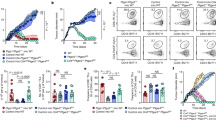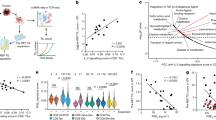Abstract
We have recently shown that human prostate cancer (PCa) cells induced apoptotic death of the most potent antigen-presenting cells, dendritic cells (DC), which are responsible for the induction of specific antitumor immune responses. Here we have evaluated the effect of murine PCa cells RM-1 on the survival of immature and tumor necrosis factor-α (TNF-α)-stimulated mature DC. PCa cells and DC were co-incubated for 24–48 h and DC apoptosis was assessed by morphologic criteria, Annexin V assay, and TUNEL staining. We have shown that co-incubation of RM-1 cells with DC is accompanied by an increased level of DC apoptosis, which was mediated by decreased expression of anti-apoptotic protein Bcl-2. Stimulation of DC maturation by TNF-α resulted in increased resistance of DC to PCa-induced apoptosis. In TNF-α treated mature DC, but not in immature DC, the expression of Bcl-2 was not blocked after exposure to RM-1-derived factors. Thus, these data suggest that TNF-α-induced maturation of DC increases their resistance to PCa induced apoptosis. This is likely to be due to the stabilizing of the expression of anti-apoptotic protein Bcl-2. The difference in the sensitivity of mature and immature DC to PCa-induced cell death should be considered during the design of DC-based clinical trials for PCa patients.
.
This is a preview of subscription content, access via your institution
Access options
Subscribe to this journal
Receive 4 print issues and online access
$259.00 per year
only $64.75 per issue
Buy this article
- Purchase on Springer Link
- Instant access to full article PDF
Prices may be subject to local taxes which are calculated during checkout
Similar content being viewed by others
References
Bander NH et al MHC class I and II expression in prostate carcinoma and modulation by interferon-alpha and -gamma. Prostate 1997 33 233–239
Herr HW Suppressor cells in immunodepressed bladder and prostate cancer patients. J Urol 1980 123 635–639
Salgaller ML et al Report of immune monitoring of prostate cancer patients undergoing T-cell therapy using dendritic cells pulsed with HLA-A2-specific peptides from prostate-specific membrane antigen (PSMA). Prostate 1998 35 144–151
Pirtskhalaishvili G et al Cytokine-mediated Protection of human dendritic cells from prostate cancer-induced apoptosis is regulated by the Bcl-2 family of proteins. Br J Cancer 2000 83 506–513
Shurin MR Dendritic cells presenting tumor antigen. Cancer Immunol Immunother 1996 43 158–164
Becker Y Anticancer role of dendritic cells (DC) in human and experimental cancers—A review. Anticancer Res 1992 12 511–520
Shurin GV, Yurkovetsky ZR, Shurin MR Tumor-induced dendritic cell dysfunction. In: Ochoa A (ed). Mechanisms of Tumor Escape Harwood Academic Publishers 2001 in press
Pirtskhalaishvili G, Shurin MR Dendritic cells in the treatment of prostate cancer. Cancer Res Alert 2000 1 89–91
Aalamian M et al Human prostate cancer regulates generation and maturation of monocyte-derived dendritic cells. Prostate 2001 46 68–75
Esche C et al CD154 inhibits tumor-induced apoptosis in dendritic cells and tumor growth. Eur J Immunol 1999 29 2148–2155
Muller R, Marmenout A, Fiers W Synthesis and maturation of recombinant human tumor necrosis factor in eukaryotic systems. FEBS Lett 1986 197 99–104
Carswell EA et al An endotoxin-induced serum factor that causes necrosis of tumors. Proc Natl Acad Sci USA 1975 72 3666–3670
Pennica D et al Human tumor necrosis factor: precursor structure, expression and homology to lymphotoxin. Nature 1984 312 724–729
Spies T et al Genes for the tumor necrosis factors alpha and beta are linked to the human major histocompatibility complex. Proc Natl Acad Sci USA 1986 83 8699–702
Matthews N Tumor-necrosis factor from the rabbit. V. Synthesis in vitro by mononuclear phagocytes from various tissues of normal and BCG-injected rabbits. Br J Cancer 1981 44 418–424
Vassalli P The pathophysiology of tumor necrosis factors. Ann Rev Immun 1992 10 411–452
Chen B et al The role of tumor necrosis factor alpha in modulating the quantity of peripheral blood-derived, cytokine-driven human dendritic cells and its role in enhancing the quality of dendritic cell function in presenting soluble antigens to CD4+T-cells in vitro Blood 1998 91 4652–4661
Lutz MB et al An advanced culture method for generating large quantities of highly pure dendritic cells from mouse bone marrow. J Immun Meth 1999 223 77–92
Shurin MR Regulation of dendropoiesis in cancer. Clin Immunol Newsletter 1999 19 135–139
Shurin MR et al FLT3 ligand induces the generation of functionally active dendritic cells in mice. Cell Immunol 1997 179 174–184
Kerr JF, Wyllie AH, Currie AR Apoptosis: a basic biological phenomenon with wide-ranging implications in tissue kinetics. Br J Cancer 1972 26 239–257
Murphy G et al Phase I clinical trial: T-cell therapy for prostate cancer using autologous dendritic cells pulsed with HLA-A0201-specific peptides from prostate-specific membrane antigen. Prostate 1996 29 371–380
Murphy GP et al Infusion of dendritic cells pulsed with HLA-A2-specific prostate-specific membrane antigen peptides: a phase II prostate cancer vaccine trial involving patients with hormone-refractory metastatic disease. Prostate 1999 38 73–78
Troy A, Davidson P, Atkinson C, Hart D Phenotypic characterisation of the dendritic cell infiltrate in prostate cancer. J Urol 1998 160 214–219
Bigotti G, Coli A, Castagnola D Distribution of Langerhans cells and HLA class II molecules in prostatic carcinomas of different histopathological grade. Prostate 1991 19 73–87
Banchereau J, Steinman RM Dendritic cells and the control of immunity. Nature 1998 392 245–252
Shurin MR, Esche C, Lokshin A, Lotze MT Apoptosis in dendritic cells. In: Lotze MT, Thomson AW (eds). Dendritic Cells: Biology and Clinical Applications Academic Press: San Diego 1999 673–692
Rath PC, Aggarwal BB TNF-induced signaling in apoptosis. J Clin Immunol 1999 19 350–364
Mannel DN, Echtenacher B TNF in the inflammatory response. Chem Immunol 2000 74 141–161
Ludewig B et al Spontaneous apoptosis of dendritic cells is efficiently inhibited by TRAP (CD40-ligand) and TNF-alpha, but strongly enhanced by interleukin-10. Eur J Immunol 1995 25 1943–1950
Josien R et al TRANCE, a TNF family member, is differentially expressed on T cell subsets and induces cytokine production in dendritic cells. J Immunol 1999 162 2562–2568
Caux C, Dezutter-Dambuyant C, Schmitt D, Banchereau J GM-CSF and TNF-alpha cooperate in the generation of dendritic Langerhans cells. Nature 1992 360 258–261
Zhang Y et al Induction of dendritic cell differentiation by granulocyte-macrophage colony-stimulating factor, stem cell factor, and tumor necrosis factor alpha in vitro from lineage phenotypes-negative c-kit+murine hematopoietic progenitor cells. Blood 1997 90 4842–4853
Santiago-Schwarz F, Belilos E, Diamond B, Carsons SE TNF in combination with GM-CSF enhances the differentiation of neonatal cord blood stem cells into dendritic cells and macrophages. J Leuk Biol 1992 52 274–281
Brand U et al Influence of extracellular matrix proteins on the development of cultured human dendritic cells. Eur J Immunol 1998 28 1673–1680
Riedl E, Strobl H, Majdic O, Knapp W TGF-beta 1 promotes in vitro generation of dendritic cells by protecting progenitor cells from apoptosis. J Immunol 1997 158 1591–1597
Buelens C et al Human dendritic cell responses to lipopolysaccharide and CD40 ligation are differentially regulated by interleukin-10. Eur J Immunol 1997 27 1848–1852
Dahlen E, Dawe K, Ohlsson L, Hedlund G Dendritic cells and macrophages are the first and major producers of TNF-alpha in pancreatic islets in the nonobese diabetic mouse. J Immunol 1998 160 3585–3593
Cumberbatch M, Kimber I Tumor necrosis factor-alpha is required for accumulation of dendritic cells in draining lymph nodes and for optimal contact sensitization. Immunol 1995 84 31–35
Roake J et al Dendritic cell loss from nonlymphoid tissues after systemic administration of lipopolysaccharide, tumor necrosis factor, and interleukin 1. J Exp Med 1995 181 2237–2247
Pulliam L, Zhou M, Stubblebine M, Bitler CM Differential modulation of cell death proteins in human brain cells by tumor necrosis factor alpha and platelet activating factor. J Neurosci Res 1998 54 530–538
Spanaus KS, Schlapbach R, Fontana A TNF-alpha and IFN-gamma render microglia sensitive to Fas ligand-induced apoptosis by induction of Fas expression and down-regulation of Bcl-2 and Bcl-xL. Eur J Immunol 1998 28 4398–4408
Sallusto F, Lanzavecchia A Efficient presentation of soluble antigen by cultured human dendritic cells is maintained by granulocyte/macrophage colony-stimulating factor plus interleukin 4 and downregulated by tumor necrosis factor alpha. J Exp Med 1994 179 1109–1118
Thurnher M et al In vitro generation of CD83+human blood dendritic cells for active tumor immunotherapy. Exp Hematol 1997 25 232–237
Acknowledgements
This study was funded by RO1 CA80126 (to MRS), RO1 CA84270 (to MRS), The Pittsburgh Foundation for Medical Research (to MRS and GP), and the DOD DAMD17-00-1-0099 P1832735 (to MRS).
Author information
Authors and Affiliations
Corresponding author
Rights and permissions
About this article
Cite this article
Pirtskhalaishvili, G., Shurin, G., Esche, C. et al. TNF-α protects dendritic cells from prostate cancer-induced apoptosis. Prostate Cancer Prostatic Dis 4, 221–227 (2001). https://doi.org/10.1038/sj.pcan.4500525
Received:
Revised:
Accepted:
Published:
Issue Date:
DOI: https://doi.org/10.1038/sj.pcan.4500525
Keywords
This article is cited by
-
4-1BB Protects Dendritic Cells from Prostate Cancer-Induced Apoptosis
Pathology & Oncology Research (2013)
-
Intratumoral cytokines/chemokines/growth factors and tumor infiltrating dendritic cells: friends or enemies?
Cancer and Metastasis Reviews (2006)



